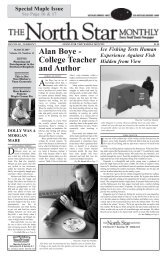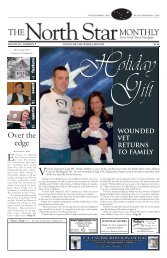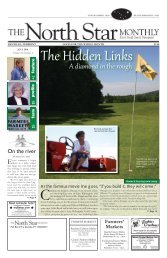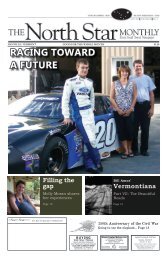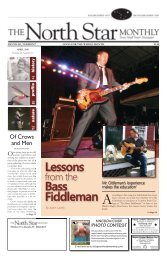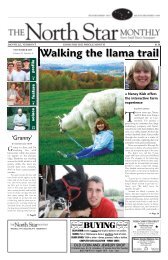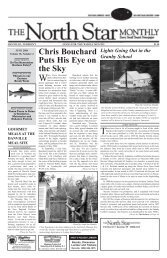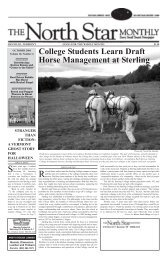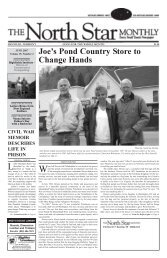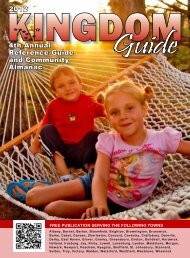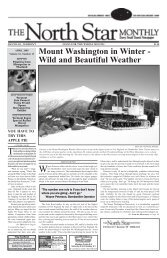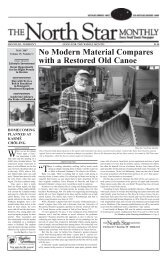March - The North Star Monthly
March - The North Star Monthly
March - The North Star Monthly
You also want an ePaper? Increase the reach of your titles
YUMPU automatically turns print PDFs into web optimized ePapers that Google loves.
2 <strong>The</strong> north <strong>Star</strong> <strong>Monthly</strong> <strong>March</strong> 2006Stop All <strong>The</strong> WhiningLindsey Kildow can’t claim a perfect childhood. She was born in a suburb of Minneapolis andpushed onto the bunny slope at a community ski area when she was 2. When she began to showpromise on skis her father, a former junior Olympic skier, moved the whole family to Vail, CO andreorganized its schedule around his daughter’s lessons and racing.By the time she was 9, Kildow was flying through slalom gates in Europe, and her family wasfar from normal. Her family, as we like to think of it, was replaced by ski teams and coaches, andher mother had had enough. She moved her four younger children back to Minnesota and filed fordivorce. She admits, “By the time Lindsey was 15, she was gone.”As I read about Kildow’s childhood I am saddened to think of all she missed: a hometown andits affection for the natural pace of childhood, friends from families with multiple interests, jokes andconversations around the family dinner table and the stability that comes only from growing up withan understanding of place. Kildow’s childhood was an international ski race fueled by the pressure tobeat everyone down the hill.At the 2002 winter Olympics in Utah Kildow had the best finish in the combined alpine eventof any of the women on the U.S. ski team. She was sixth overall. Her racing and training pushed on,and this year in Turin, Italy she was viewed as a favorite. She carried much of the hope of the teamon her 21-year-old frame.<strong>The</strong>n in an afternoon training run on the ice glazed downhill course, Kildow crashed. Shecaught an edge and cartwheeled high into the air and landed hard on her back beyond the fringe ofthe course. In the television replays, we saw again and again what ski instructors call a “yard sale” -an equipment spraying fall that left Kildow motionless. Snow was still settling when the helicopterwas on its way for a medical airlift to the hospital. It could have been the end - the end of Kildow’s2006 Olympics, the end of her ever skiing again or worse, but two days later she was back in thestarting gate, bruised but unbroken and trying not to think about her fall.Kildow was back and showing a determination and a work ethic that I want to celebrate. Shedid race again, and she finished in an incredibly honorable eighth place. Lindsey Kildow went so farbeyond the minimum standard of what’s acceptable that if it were up to me I’d proclaim her anational symbol of outstanding performance. For crying out loud, we would have been thrilled ifshe’d watched the next race from the back window of an ambulance, but no she chose to shuffle outof her hospital room, lock into her ski bindings and redefine our understanding of true grit. At a timewhen so many of our cultural icons (and their agents) seem to whine and want more for the same (ifnot less), Lindsey Kildow might have caved in. Instead she stood tall. She adjusted her goggles onemore time, and she wouldn’t settle for less than heroic determination. That’s my idea of Olympicspirit, and I’m proud she was wearing our flag.Terry HofferA Challenging Recipeingredients: A vulnerable group of people with chronic mental health problems who are perpetuallyin the underdog position when advocating for their needs. Under funding of mental healthservices (a chronic problem of societal proportions). <strong>The</strong> human tendency to place a disproportionateemphasis on negative consequences. <strong>The</strong> superior power of fear, particularly close-minded fear,over reason to motivate behavior.directions: Season with a pinch of bias, a soupcon of misperception, and a dab of resistance tochange. Leaven with civility and a willingness to speak out in public.Let the first two ingredients ferment in a sluggish and conflicted bureaucracy, then add remainingingredients and blend in a rapidly moving real estate market.Present this fare to the news hungry through media whose survival depends on sales and findsthat controversy makes for better sales.<strong>The</strong> recipe metaphor is a succinct way for me to point out some difficulties <strong>North</strong>east KingdomHuman Services (NKHS) faces as this organization strives to improve mental health services in the<strong>North</strong>east Kingdom. NKHS is responsible for providing services to the chronically mentally ill anddevelopmentally disabled in Caledonia, Essex and Orleans counties. Following the model that theill, whether physically or mentally ill, are better served when they are closer to their support systems- families and community - NKHS has been working for nearly a year to develop a residential treatmentfacility in the habitually underserved <strong>North</strong>east Kingdom. Such a treatment facility is to servepeople with chronic mental illness who are not yet able to live on their own but no longer require theintensity of hospital-based psychiatric care. <strong>The</strong> facility is intended to be a nurturing environmentwhere people can recover their sense of worth and purpose, become proficient with essential lifeskills and, if appropriate, receive vocational training. Looking at potential properties around the<strong>North</strong>east Kingdom, NKHS thought it might have a viable option in Greensboro. Opposition to thisproposal by some of Greensboro’s residents has been swift and vocal.<strong>The</strong> need for mental health services in the <strong>North</strong>east Kingdom is acute. I am saddened by theresponse to the NKHS proposal in Greensboro. Although any community can be an active participantin the therapeutic program of a residential treatment facility, it certainly is not a requirement.Simply being neighborly, something that most of us in Vermont pride ourselves upon, is all that isreally needed.People with chronic mental illness should not be cloistered at the end of a dirt road. <strong>The</strong>ythrive on the same human contacts, albeit of a different pace and intensity at times, that we allrequire. Whether in Greensboro or elsewhere, I support the efforts of NKHS to develop a residentialprogram in a supportive community in the <strong>North</strong>east Kingdom. As so eloquently written by JayNeugeboren in a recent issue of Newsweek, “Let’s find resources to give people afflicted with mentalillness what all of us need: fellow human beings upon whom we can depend to help us throughour dark times and, once through, to emerge into gloriously imperfect lives.”Tim TannerediTOrial OfficeS:P.O. Box 319 ~ 29 Hill StreetDanville, VT 05828-0319(802) 684-1056ediTOr:Terry HofferarT direcTOr:Suzanne TannercOnTriBUTinGediTOr:Tim TannercircUlaTiOn:Kathy HofferadVerTiSinG:Vicki MooreediTOrial adViSOrYBOard:John HaygoodJane LarrabeeSusan LynaughBetsy McKay<strong>The</strong> north <strong>Star</strong> <strong>Monthly</strong> (ISSN#1043-8041) is produced andpublished monthly by Polestar Publishing, Inc. located at 29 Hill Street,Danville, VT. Subscription Rates are $15.00 per year. Printed in USA.Copyright 2006 by Polestar Publishing, Inc. All rights reserved. No partof this publication may be reprinted or otherwise reproduced withoutexpressed permission from Polestar Publishing, Inc. Publisher is notresponsible for errors resulting from typographical errors. Acceptance ofadvertising is subject to publisher’s approval and agreement by theadvertiser to indemnify the publisher from loss or expense on claimsbased upon contents of the advertising. Publisher does not assume liabilityfor errors in any advertising beyond the cost of the space occupiedby the individual item in which the error appeared.Postmaster: Send address changes to <strong>The</strong> north <strong>Star</strong> <strong>Monthly</strong>,P.O. Box 319, Danville, VT 05828-0319. Periodical postage paid atDanville, VT.contributors to this issue include: Lorna Quimby, JeffGold & Ellen Gold, Lois (Field) White, John Downs, Isobel P.Swartz, Rachel Siegel, Paula LaRochelle, Richard Quimby, VanParker, Reeve Lindbergh, Vanna Guldenschuh, Alice S. Kitchel& Burton Zahler, Bill Christiansen, Dee Palmer, Gail Lawrence,Ann Staffeld, Lynn A. Bonfield, Allison Wilson Waterman, SeanO’Connor, Liz Sargeant and Matt Clancy.e-mail: northstar@kingcon.comwww.northstarmonthly.comWritetoUsLETTERS: Write to <strong>The</strong> <strong>North</strong> <strong>Star</strong>, and let usknow what’s on your mind. Your point of viewor observation is important to us. Letters mustbe signed.ARTicLES: We don’t have a big staff of writers.So we look forward to you sending yourwriting. If you have questions or ideas andwant to ask us first, please call. We’ll send ourguidelines. No fiction, please.PhoToS: We’d like to see your photos andwelcome them with a story or without. <strong>The</strong>ycan be black-and-white or color, but they mustbe clear.PRESS RELEASES: We prefer press releasesthat are unique to <strong>The</strong> <strong>North</strong> <strong>Star</strong>.DEADLinE: 15th of the month prior to publication.All materials will be considered on a spaceavailable basis.Letters tothe Editor:Beaupre Owned northernVermontDear <strong>North</strong> <strong>Star</strong>,I wish to respectfully takeexception to the article “RollieBeaupre Quartet Owned <strong>North</strong>ernVermont” by Lois White. I amcertainly not taking anythingaway from the music or the musiciansinvolved as they were terrificmusicians who played greatmusic.However, there were othergroups who also played goodmusic at the same time and playedin the same or even larger areas. Imust start with my group, knownas the TD trio and includedWilfred “Willy” McClure, pianoand organ, Bernie Whitehill, guitarand bass, and myself, Lee“Stony” on drums. Later weadded Bruce Warner, sax, andbecame TD Trio + 1. We played<strong>North</strong>ern Vermont and NewHampshire and Quebec for 25years. We played at Gracie’s Innin Lyndonville for many yearsand on radio station, WTWN,now WSTJ, from Gracies for atime with Don Mullaly at the controls.We played at the manyclubs, restaurants, weddings andthe Lyndon Institute annual alumniball for many yearsAlso to be remembered in thearea at that time were the bandsled by Leo Giguere, Rin Wright,Chet Howard and others who allowned part of the <strong>North</strong> Country.One other band, up north,<strong>The</strong> Melody Men, played at theold Red Wing, which became theElks Club, for many years, as well(Please See Letters on Page 4)



